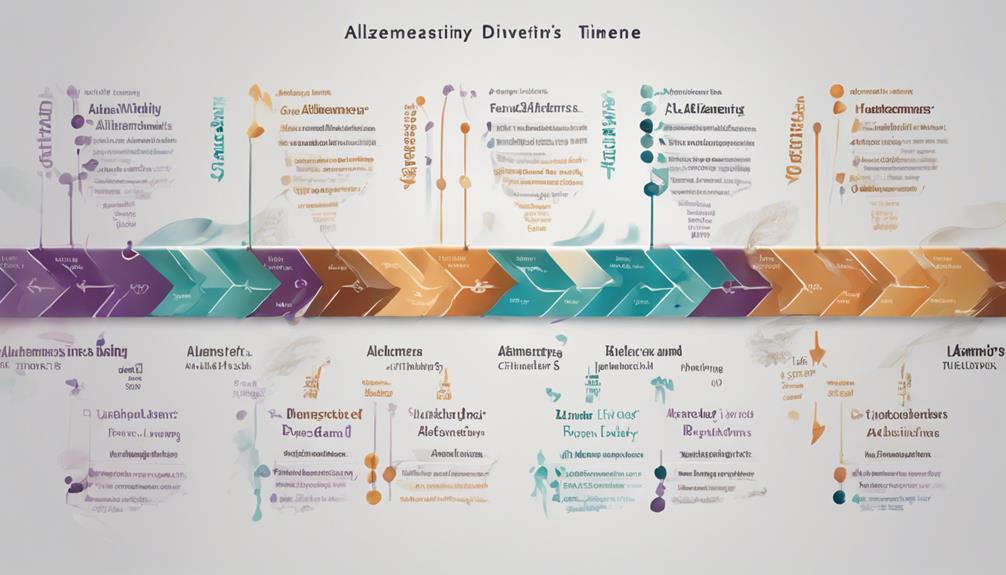In early-onset Alzheimer’s, the progression tends to be more rapid. Younger patients often experience a swift decline in cognitive abilities, necessitating specialized care. The quick deterioration in memory may require intensive support services. It is crucial to understand the age at which symptoms begin for an accurate prognosis. Care plans should be individualized to address the unique challenges faced by younger patients. Research indicates that different dementia types have distinct characteristics that impact care strategies. Timely access to support services is essential for effectively managing symptoms. Healthcare providers must be prepared for the prognosis in early-onset cases. Stay informed about the progression of Alzheimer’s to better grasp the challenges that lie ahead.
Key Takeaways
- Early-onset Alzheimer's progresses more rapidly than late-onset cases.
- Faster cognitive decline observed in younger patients with early-onset Alzheimer's.
- Timely access to support services crucial due to accelerated disease progression.
- Different dementia types may present unique challenges for care planning.
- Caregivers play a crucial role in providing necessary assistance for younger patients.
Rapid Progression in Younger Patients
When contemplating the progression of early-onset Alzheimer's, it becomes apparent that younger patients experience a notably swifter decline compared to older-onset cases. In younger patients with early-onset Alzheimer's disease, the rapid progression can lead to a quicker deterioration in cognitive abilities. This accelerated decline highlights the vital need for prompt access to support services. Due to the faster disease progression, younger individuals may require more thorough support services to address their needs adequately.
Understanding the age of symptom onset in early-onset Alzheimer's is essential for prognosis and care planning. Younger patients facing this disease may require specialized care plans tailored to their unique circumstances. Caregivers of younger patients should be prepared for the increased burden and stress that come with the faster decline in cognitive functions. Providing extensive support services and monitoring the disease progression closely can help in managing the challenges that younger patients with early-onset Alzheimer's may face.
Impact of Early Onset on Prognosis

Moving from the discussion on rapid progression in younger patients with early-onset Alzheimer's, we observe a significant impact of the disease's early onset on prognosis. Younger patients with early-onset Alzheimer's experience a faster cognitive decline, leading to more rapid memory deterioration compared to older individuals with late-onset Alzheimer's. This accelerated progression necessitates intensive support services and frequent clinical reviews to monitor symptom progression effectively. Understanding the age of symptom onset is important for developing tailored care planning and ensuring appropriate support services are in place.
Prognosis for younger patients with early-onset Alzheimer's is affected by the quicker advancement of the disease, which can result in a higher burden on both the patients and their caregivers. Hence, timely access to support services is crucial to provide the necessary care and assistance for managing the symptoms effectively. By recognizing the challenges posed by the accelerated progression of early-onset Alzheimer's, healthcare providers can better prepare to offer the needed support and care for these individuals.
Need for Tailored Support Services
Recognizing the accelerated progression of early-onset Alzheimer's underscores the critical need for tailored support services to address the unique challenges faced by younger patients. When dealing with Alzheimer's in younger individuals, specialized care planning becomes essential due to the rapid progression of the disease. Personalized care plans are vital to meet the faster decline in cognitive abilities and overall health in this demographic.
Here are three emotional aspects to take into account when providing support services for younger patients with early-onset Alzheimer's:
- Providing compassionate and understanding care to alleviate the stress and burden on both the patients and their families.
- Offering guidance and resources to navigate the complexities of managing Alzheimer's at a younger age.
- Creating a supportive environment that fosters a sense of belonging and comfort for individuals facing quicker deterioration in their cognitive functions.
Tailored support services play a pivotal role in enhancing the quality of life for younger patients with Alzheimer's by addressing their unique needs and ensuring they receive the necessary care and assistance during this challenging journey.
Understanding Age of Symptom Onset

Understanding the age of symptom onset in Alzheimer's disease is essential for accurate prognosis and effective care planning. Early-onset Alzheimer's disease refers to the condition developing in individuals under 65 years old. Research indicates that this form of the disease progresses more rapidly than the late-onset type, resulting in a quicker decline in memory and cognitive functions.
Younger individuals with Alzheimer's often require more frequent clinical evaluations to monitor this rapid progression closely. Due to the accelerated nature of the disease in younger patients, rapid access to support services becomes critical. Such fast decline can place a significant burden on both the affected individual and their caregivers.
Hence, understanding the age at which symptoms first appear is crucial for determining prognosis and developing appropriate care plans that incorporate tailored support services for those diagnosed with early-onset Alzheimer's disease. Caregivers play a crucial role in providing the necessary assistance and support to individuals facing this challenging condition.
Research on Different Dementia Types
Research in dementia types reveals distinct characteristics that impact care strategies for individuals with early-onset Alzheimer's disease. When exploring different dementia types like vascular dementia and frontotemporal dementia, it becomes evident that each presents unique challenges for care planning in cases of early-onset dementia. Here are three emotional points to take into account:
- Research: Understanding the specific progression patterns of various dementia types through ongoing research can offer hope for better treatment options tailored to individual needs.
- Support Services: Rapid access to support services becomes a lifeline for younger patients facing the accelerated cognitive decline associated with early-onset Alzheimer's.
- Care Planning: Tailoring care plans based on the unique disease progression of each individual can provide comfort and stability in navigating the challenges of early-onset dementia.
Addressing Specific Needs of Younger Patients

Exploring the unique challenges faced by younger patients with early-onset Alzheimer's reveals the critical need for tailored support services to address their accelerated cognitive decline. Younger patients with early-onset Alzheimer's experience faster progression of the disease, leading to quicker memory deterioration and cognitive decline compared to older individuals. Due to this accelerated decline, it's essential for these individuals to have access to specialized support services that cater to their specific needs. Clinical reviews are essential for monitoring the progression of symptoms in younger patients with early-onset Alzheimer's, as they may require more frequent assessments to track the disease's advancement accurately.
Understanding the age of symptom onset in young-onset Alzheimer's is fundamental for prognosis and care planning. Tailored support services play a vital role in providing comprehensive care to younger patients, considering the faster pace at which the disease progresses in this population. By implementing these specialized services, healthcare providers can better address the unique needs of younger individuals with early-onset Alzheimer's, enhancing their quality of life and overall well-being.
Frequently Asked Questions
How Fast Does Early Onset Alzheimer's Progress?
Early onset Alzheimer's progresses rapidly, causing swift deterioration in memory and brain functions. Younger individuals may require more frequent clinical reviews. Immediate access to support services is vital due to accelerated cognitive decline, impacting patients and caregivers immensely.
What Is the Life Expectancy of a Person With Early Onset Alzheimer's?
We acknowledge the concern about life expectancy with early-onset Alzheimer's. It ranges from 8 to 10 years. Factors like health and age influence this. Early diagnosis and care can improve quality of life.
What Causes Alzheimer's to Progress Quickly?
Alzheimer's progression can speed up due to factors like genetics, lifestyle, and overall health. Early detection and proper care are crucial. We must prioritize timely screenings and support services to manage the disease effectively.
What Is Considered Early Onset for Alzheimer's?
Early onset Alzheimer's is typically diagnosed in individuals under 65. Symptoms may appear in the 30s or 40s. Cognitive difficulties can start before 65. Atypical symptoms include visual impairments, speech issues, and judgment problems.
Conclusion
To sum up, research indicates that early onset Alzheimer's may progress faster in younger patients, leading to a more rapid decline in cognitive function. According to the Alzheimer's Association, individuals under the age of 65 with early onset Alzheimer's tend to exhibit a more aggressive course of the disease compared to older adults. Additionally, younger patients often experience more severe symptoms earlier in the disease, including significant memory loss, disorientation, and challenges with daily tasks. Brain fog and Alzheimer’s disease frequently go hand in hand, with patients describing increased mental fatigue, difficulty focusing, and a sense of confusion even during routine activities. These cognitive impairments can drastically affect their quality of life and independence at a critical stage in their personal and professional lives.
It's essential for healthcare providers and support services to tailor their approach and interventions to meet the unique needs of younger patients facing this challenging condition.









